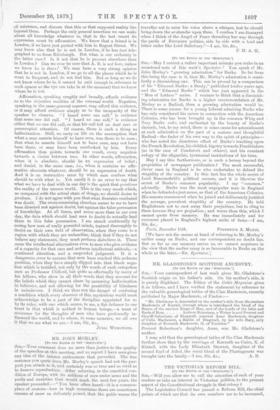[TO THE EDITOR OP THE "SPECTATOR. ") SIR,—May I correct a
rather important mistake you make in an occasional note of this week's Spectator ? You speak of Mr. John Morley's "growing admiration" for Burke. So far from this being the case is it, that Mr. Morley's admiration is mani- festly a diminishing one. This can be proved by a comparison of his "Edmund Burke; a Study," published twelve years ago, and the " Edmund Burke " which has just appeared in the "Men of Letters" series. I venture to think that a:diminish- ing admiration for Burke is a higher recommendation of Mr. Morley as a Radical, than a growing admiration would be. There is some excuse for a young Liberal admiring Burke who has only considered his career in connection with the American Colonies, who has been brought up in the common Whig and . Tory Burke mate, and enchanted by the beauty of Burke's rhetoric, but, to my mind, there is some cause for astonishment at such admiration ou the part of a mature and thoughtful Radical—the finder of his own way to the spirit of principles— who has noted the disastrous effect of Burke's teaching upon the French Revolution, his childish bigotry towards Freethinkers (as in the case of Condorcet and others), and his constant eulogy of the oligarchic, tyrannical institutions of his time.
May I say this furthermore, or is such a heresy beyond the proprieties of newspaper publication ? The most successful, clever man in England is he who undertakes to defend the stupidity of the country. In this fact lies the whole secret of Lord Beaconsfield's political success, and it is likewise the secret of Burke's common popularity. I say " common," advisedly. Burke was the most unpopular man in England when he defended a just cause, as that of the American Colonies. His renown commenced when he joined and deliberately justified. the average, prevalent stupidity of the country. He told Englishmen not to cast away their prejudices, but to cling to them because they are prejudices ; and worse than this, which I cannot quote from memory. He was immediately and for evermore placed in England's highest niche of fame.—I am, Sir, &c., [We have not the means at hand of referring to Mr. Morley's earlier essay on Burke, and our correspondent no doubt has. But so far as our memory serves us, we cannot acquiesce in the view that the earlier essay is so favourable to Burke on the whole as the later.—En. Spectator.]






































 Previous page
Previous page